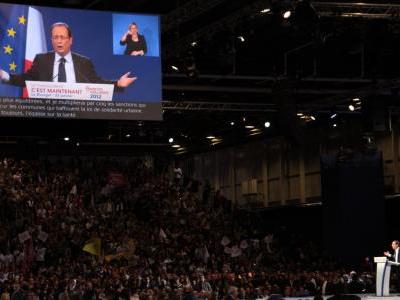François Hollande: he who dares, wins?
« My adversary has no name, no party, no face. And yet he is charge.
My adversary is the world of finance. »
There's little doubt about it, if François Hollande wanted a phrase to define his first major rally in this election campaign, he's found it.
Killing two birds with one stone, he brushed aside Nicolas Sarkozy, omitting to mention the President's name once, and singled out what he reckons is the source of many ills in France.

All in all, Sunday's rally at Le Bourget, just North of Paris, is likely to be considered a success by the Socialist Party. Lots of noise. Cheering. Flag waving. Queues outside as more people than expected turned up (vital rule of poltics: make it look like you're popular). Popular singer Yannick Noah giving it some welly as a warm-up act. Smiles all round from the party barons, the « éléphants ».
François Hollande's spin doctor, Manuel Valls (officially « director of communications » but known to have oversight over pretty much everything the candidate does in public, and renowned for his control freakery) was apoplectic as the candidate made his entrance: this was an event that was scripted to the last detail; who sits next to who, (and who doesn't sit next to who); when activists sing and when they wave their flags. And here we have Hollande, pausing as he makes his way through the crowd, shaking interminable hands; shaking off, for a moment, Valls' demands to be on time.
It was a good speech, too; one that is worth being remembered (although whether it'll be remembered as a breakthrough ... won't be known until May!). François Hollande has been much mocked for being either a) wooden or b) jovial. He was neither on Sunday: his voice croaked as he bellowed out his message; sweat broke out on his brow as he flailed his arms to underline his point.
He clearly made a step leftwards with the promise to Get The Financial Sector. That's important, both to reassure the party, and to ensure he stands out from his rivals that are closest in the polls (that means François Bayrou). « I offer a clear choice, between Right and Left ». There's little room for dithering, there.
The closest we got to a reference to Sarkozy was oblique, and disparaging: « improvising measures at the end of your mandate isn't the way to do things ». Shunning his main rival marks this speech out from his inauguration as candidate last Autumn, where every second sentence seemed to wag a finger at the President and his rule.
Instead, this speech was about « je », a lot, and « nous », a fair amount. His goal, there, clearly to outline he is ready for the task; all the French have to do is vote for him. And the Socialist Party, too, is ready to rule.
He and they have « drawn the lessons » from the catastrophe of April 2002 (when the Front National beat the Socialist's Lionel Jospin into third); he wants to reignite the « joy » of May 1981, when François Mitterrand became modern France's first (and, so far, only) Socialist president.
But really, what good does the rally do in the campaign?
You can argue that it's zero-sum: if it goes well, you mobilise the base; badly, and it can alienate the undecided. 2007 saw Sarkozy's colossal effort at Bercy help him overhaul Ségolene Royal. Her speech – clutching her fist and hailing, almost in a state of trance, that what she wanted was « for every child that is born and lives in France the same that I want for my own children » - was judged too emotional by many.
at about 7'
And, probably more importantly, what about the masses of disenchanted voters? They're unlikely to give two hoots about this rally; as Nathalie, an activist from Sèvres pointed out, when she goes leafleting, door-to-door, the election and the candidates are far from people's minds. « It's not a campaign like the others in the past. In these hard times, people don't know who to vote for. Their real concern is to find out which one of the candidates will get them out of the crisis ».
With promises to soak the rich financiers clique, François Hollande is playing it safe with his own party; vowing to make France a better place to grow up may not be new, but it does strike a chord. Both allow him to point the finger at – but not name – the man he judges responsible, the man he hopes to replace, Nicolas Sarkozy.
By Luke Brown



0 Comments
Post new comment